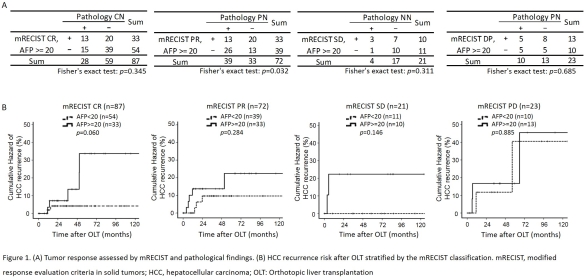Predictive Value of mRECIST in HCC Response to the Neoadjuvant Locoregional Therapies and Prognosis Affected by the Peak AFP Level before Liver Transplantation
1Department of Surgery, Section of Abdominal Transplantation, Washington University School of Medicine, St. Louis, MO
2Department of Radiology, Washington University School of Medicine, St. Louis, MO
3Department of Imaging Sciences, University of Rochester Medical Center, Rochester, NY.
Meeting: 2018 American Transplant Congress
Abstract number: B273
Keywords: Hepatocellular carcinoma, Liver transplantation, Radiologic assessment, Tumor recurrence
Session Information
Session Name: Poster Session B: Liver: Hepatocellular Carcinoma and Other Malignancies
Session Type: Poster Session
Date: Sunday, June 3, 2018
Session Time: 6:00pm-7:00pm
 Presentation Time: 6:00pm-7:00pm
Presentation Time: 6:00pm-7:00pm
Location: Hall 4EF
PURPOSE: The modified response evaluation criteria in solid tumors (mRECIST) has been used to assess the response of hepatocellular carcinoma (HCC) to locoregional therapy (LRT) but does not consistently reflect findings on explant pathology. This study investigated whether mRECIST assessments of response to LRT are affected by peak AFP levels. METHODS: This retrospective, a single-center study included all patients with HCC burdens within Milan criteria treated with LRT before orthotopic liver transplantation (OLT) from 2000-2014. Tumor response to LRT was scored per mRECIST criteria and reported as complete response (CR), partial response (PR), stable disease (SD), or disease progression (DP). The tumor response to LRT was also assessed pathologically on explants as complete necrosis (CN), partial necrosis (PN), or no necrosis (NN). Patients were stratified by peak AFP using a cutoff value of 20ng/mL. The AFP distributions were assessed with Fisher's exact test, and HCC recurrence was examined by Kaplan-Meier (KM) analysis. RESULTS: Of the 203 patients met our study criteria, 22 had HCC recurrence after OLT. Among the 72 patients with PR after LRT, the proportion of PN on pathology was significantly higher for individuals with peak AFP < 20ng/ml than for individuals with peak AFP ≥20ng/ml (p = 0.032). The positive predictive values of PR for PN were 39.0% and 66.7% for pre-OLT peak AFP values of ≥20 ng/ml and <20 mg/ml, respectively. Furthermore, patients with CR had marginally higher tumor recurrence rates when peak AFP was ≥20ng/ml. CONCLUSION: The value of PR on mRECIST after LRT for predicting PN on explant pathology is significantly better when peak AFP levels are <20ng/ml. Further studies are required to validate the findings in the present study. 
CITATION INFORMATION: Xu M., Fraum T., Garcia-Aroz S., Vachharajani N., Saad N., Fowler K., Lin Y., Chapman W. Predictive Value of mRECIST in HCC Response to the Neoadjuvant Locoregional Therapies and Prognosis Affected by the Peak AFP Level before Liver Transplantation Am J Transplant. 2017;17 (suppl 3).
To cite this abstract in AMA style:
Xu M, Fraum T, Garcia-Aroz S, Vachharajani N, Saad N, Fowler K, Lin Y, Chapman W. Predictive Value of mRECIST in HCC Response to the Neoadjuvant Locoregional Therapies and Prognosis Affected by the Peak AFP Level before Liver Transplantation [abstract]. https://atcmeetingabstracts.com/abstract/predictive-value-of-mrecist-in-hcc-response-to-the-neoadjuvant-locoregional-therapies-and-prognosis-affected-by-the-peak-afp-level-before-liver-transplantation/. Accessed July 5, 2025.« Back to 2018 American Transplant Congress
